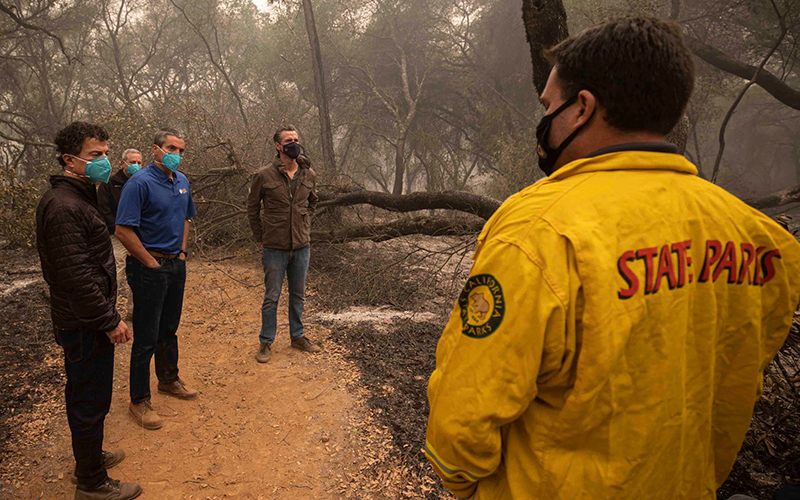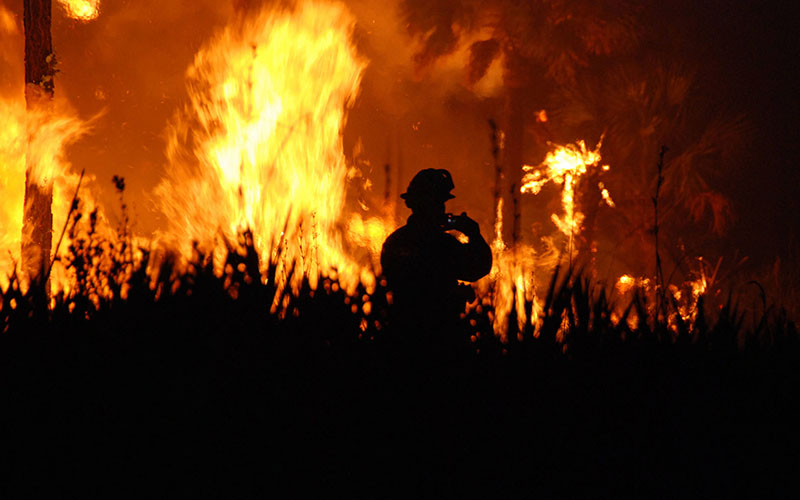
California Gov. Gavin Newsom stands near charred trees in Oroville on Friday to address wildfires ravaging his state, which he blames on man-made climate change. (Photo courtesy of California Environmental Protection Agency)
Surrounded by choking smoke and fire-scorched trees near Oroville, California Gov. Gavin Newsom told reporters Friday that wildfires ravaging the West this summer are a direct result of climate change, and he called for swift and serious changes to federal environmental policy.
Oroville, about 70 miles north of Sacramento, has been ravaged by the North Complex Fire, which had claimed 10 lives as of Thursday evening, fire officials reported.
Statewide, 20 people have died from wildfires, and Newsom said that toll could increase as searchers Friday looked for 16 people reported missing.
Newsom said nearly 3.2 million acres have burned in California in more than 7,700 wildfires this season. He estimated that it will cost $2 billion to clean up and restore Butte County alone.
“The science is absolute – the data is self-evident,” the governor said. “The experience that we have in the state of California just underscores the reality of the ravages of climate change.”
Studies have shown that the effects of climate change, which includes drier vegetation and a longer fire season, mean that wildfires in the West are likely to continue to increase in both frequency and severity.
“The hots are getting a lot hotter, the dries are getting a lot drier, and the wets are getting a lot wetter,” Newsom said. “That’s climate change.”
This isn’t a “because…2020” thing. This isn’t going away January 1.
What we are experiencing is an existential climate CRISIS. pic.twitter.com/42QeAaZ353
— Gavin Newsom (@GavinNewsom) September 11, 2020
Newsom emphasized that the situation will continue to get worse for the state and the U.S. as a whole.
“We’re going to have to fast-track our efforts,” he said. “While it’s nice to have (state) goals to get to 100 percent clean energy by 2045, that’s inadequate to meet the challenges this state, and I’d argue this nation, faces.”
California isn’t alone. Oregon and Washington, as well as parts of Arizona and Nevada, also have experienced devastating wildfires this season, reducing air quality across much of the West.
National Weather Service officials in Phoenix on Friday reported smoke from California blazes moving east into southern Arizona, and it may continue into the weekend.
Smoke from California wildfires will continue to stream into the region today ? #azwx #cawx pic.twitter.com/YHMFyh9BFI
— NWS Phoenix (@NWSPhoenix) September 11, 2020
While Newsom spoke in Northern California, the nearly 24,000-acre Bobcat Fire raged in the Angeles National Forest in Los Angeles County, where skies were somber and gray.
Fire officials said winds were pushing the flames northeast, and areas south of the fire, including Pasadena, remained under an evacuation warning.
Kimberly Silverio-Bautista, an Arizona State University graduate student who lives in Pasadena, said her family was trying to stay inside as much as possible to avoid the smoke, but even indoors they could feel its effects, exacerbating their allergies.
“Just by waking up today, I just felt my throat was really dry because of the air quality,” said Silverio-Bautista, a Cronkite News reporter. “Our eyes get really irritated and our allergy symptoms come out.”
Due to the scope of this year’s fires, the dangers they pose only now are becoming a reality for some who never thought they would be at risk.
Oregon native Hadley Heck, who’s a sports journalism grad student at ASU, said that before this year, her experiences with wildfires when she lived in Corvallis were limited to smoke and ash from fires elsewhere. On Thursday, the Corvallis city manager declared a local emergency as wildland fires in neighboring counties “displaced residents, destroyed structures” and smoke made air quality hazardous.
Now, she said, having the fires so close to home is terrifying.
“I find myself thinking a lot about all the California fires that have happened, and I think about the fear that all those people felt,” Heck said. “I wish that I understood it and had a better perspective when all that was going down, because now that it’s so close it’s definitely a lot scarier.”
Heck, who’s in Arizona reporting for Cronkite News, had spent time in Oregon with family earlier this summer. It’s difficult, she said, to see pictures of the devastation since her visit.
“Thinking back to my most recent memories in Oregon, and living in this beautiful state and all the wildlife and the beautiful trees … just thinking about it now is definitely scary, and somewhat heartbreaking, to be honest,” Heck said.


